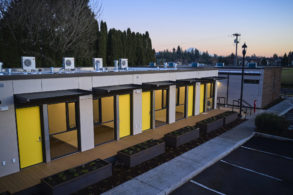
Even as news hits of Softbank's $200 million bailout of Katerra, big tech is continuing to make big bets on modular as part of an unprecedented effort to address the nation's affordable housing crisis, and the effort is helping to spur new approaches to modular single and multifamily housing that may give a significant boost to the sector. Just this week, Amazon announced a fresh $2.0 billion commitment to affordable housing in three hub cities. Previously, Apple pledged $2.5 billion to an affordable housing initiative in California, and Facebook announced a commitment of $1 billion to the effort. While the funds are being allocated in a variety of ways, a significant part of the effort seems to be focused on finding ways to reduce the actual cost of building homes, themselves, and that has the tech giants investing in modular tech.
Pop Quiz: What Construction Company Counts Autodesk, Facebook, and Google as Investors?
Founded in 2017, Bay Area modular housing startup, Factory_OS announced a $55 million series B last November on top of almost $23 million raised previously. Autodesk was already an investor from the prior round but was joined by Google, Facebook and other big names in the most recent round. Achievements for the company appear to be pretty impressive. Beyond significant cost savings, reported achievements include greatly increased speed of delivery, higher energy savings, and a host of other social benefits. In a statement on its website, Facebook wrote:
"In November Facebook also invested in Factory_OS, an innovative local company that employs 500 union workers to build modular housing that reduces the cost of housing construction— because as long as it continues to cost $650,000 to build one affordable apartment in the Bay Area, the housing crisis will persist."
The statement underscores the persistent view within the tech community that, as they commit billions to addressing housing affordability, reducing the actual cost of building homes is a critical and addressable subset of the larger problem.
Blokable: Big Tech's Modular Push Extending Beyond the Golden State

Next week, we will welcome Blokable co-CEO, Aaron Holm on our Modular Housing Analyst Call. Launched in 2016, Blockable garnered investment from Salesforce CEO Mark Benioff Among others, as part of plans for a $23 million plant in California. However, the push by tech leaders extends beyond the Golden State. Recently, Blokable unveiled, Phoenix Rising, an Auburn, Washington housing development "at a cost to the state of $125,000 per door." Blokable claims these energy efficient, "high quality" units are, thus, less than half the average cost. Beyond high profile investment, Blokable is also worthy of focus because the company's model is also different from the typical model of earlier modular startups.
And Big Tech Investments List Goes On
Factory_OS and Blokable aren't the only modular home companies garnering interest from the Big Tech community. Amazon has also Invested in Modular, participating in a $6.7 million round in Plant Prefab back in 2018. People, then, speculated the move might be part of an effort to deepen roots in the smart homes business. Meantime, a host of "A" list investors including Fifth Wall, Google Ventures, and celebrity-turned investor, Ashton Kucher recently invested in a $35 million series B round for California-based, Homebound, a "tech-enabled general contractor."
Want More on Modularization in the Built Worlds?
Join the Network to attend our interactive modular conference and call sessions, meet the experts, and learn from our session videos and research.
Exorcising Ghosts of Silicon Valley's Modular Past
Some in the industry may point to Silicon Valley's mixed history with modular housing, as a basis to question whether this recent round of investment will be successful. Beyond Katerra's recently publicized challenges, there is also the history of Blu Homes. Founded in 2007, Blu Homes raised nearly $200 million and established a manufacturing plant in the same Bay Area Facility where Factory_OS is now located. Citing costs, the company moved production out of the Bay Area in 2017 and more recently, the company was sold to Dvele, a San Diego-based modular home builder founded in 2017.
Despite challenges along the way, modular building is steadily gaining traction around the world. A recent report by Fortune Business Insights predicted the global modular building market would grow from $67.74 billion in 2019 to $106.22 billion in 2027. We look forward to speaking with our industry experts this month and every month to gain a much deeper understanding of who the winners in this vital sector will be and why, as this market continues to grow and mature.
ABOUT BUILTWORLDS BRIEFINGS:
BuiltWorlds Briefings offer the BuiltWorlds Community perspectives on news affecting the community, opportunities to learn about network members, and also information about programming, research and other activities within the BuiltWorlds Member Network and broader BuiltWorlds Free Subscriber community. BuiltWorld Analyst Briefing are made possible through the support of the members of the BuiltWorlds Network.
ABOUT BUILTWORLDS:
BuiltWorlds is the buildings and infrastructure industry’s leading professional network for open innovation, keeping companies in the worlds of engineering, construction and related fields informed and connected, and helping them find avenues to collaborate for their own strategic success and for the betterment of the industry, as whole. For more information about BuiltWorlds, visit the BuiltWorlds Network or sign up for the BuiltWorlds Newsletter to stay connected to the Community for free.

Discussion
Be the first to leave a comment.
You must be a member of the BuiltWorlds community to join the discussion.